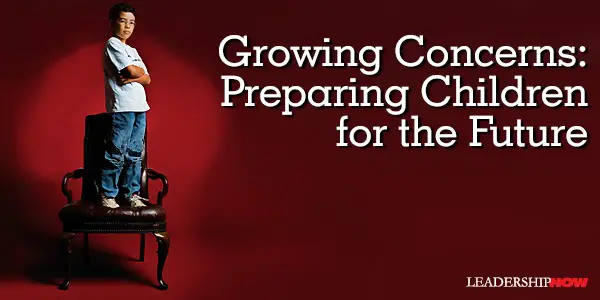 |
 |
07.24.06

Growing Concerns: Preparing Children for the Future
AT the 2005 National Education Summit on High Schools, Bill Gates remarked, “America’s high schools are obsolete. By obsolete, I don’t just mean that our high schools are broken, flawed, and under-funded – though a case could be made for every one of those points. By obsolete, I mean that our high schools – even when they’re working exactly as designed – cannot teach our kids what they need to know today. [W]e have to understand that today’s high schools are not the cause of the problem; they are the result.” In our conversations with a local school district, we suggested that the problems in the district are by and large brought on by the system itself. Unfortunately, they can’t get over the notion that the district's problems are the lack of money. True, due to the lack of money the Band-Aids are failing, but they are only a symptom. Unless the school board can drop this mindset, they will continue to face the same problems but with increasing intensity as time goes on. Obsolete paradigms keep otherwise bright people dumb because they can’t learn what needs to be done and develop a new approach. They have the answers but unfortunately, they can't see them.”  Michael Wald: I actually think childhood is getting longer. As more and more children go on to higher education, they are more dependent upon their families for longer periods of time. They live with their families well into their 20s. And most outcomes that we measure to gauge children’s well-being have improved in recent years.” William Damon: They’re creating their own families as much as a decade later than historical norms. And work commitments are being postponed beyond what any economy has ever tolerated in history. It creates a kind of moratorium where people can discover themselves and play out a lot of different possibilities, but the downside is that it creates uncertainty about what you’re going to end up doing in life. If you go back even a generation or two in our own society, when more kids were living on farms or helping their parents run delicatessens or whatever, they were taking responsibility early. I mean there were 14-year-old kids driving tractors all over this country and helping bring home the bacon. We’re not giving kids those kinds of responsibilities, even in disadvantaged families. Sometimes kids go out and get jobs at McDonald’s, but that’s different. They’re not running a little family business or preparing for a vocation, becoming a fisherman like Dad. A lot of kids are drifting, and are not so happy about it.” William Damon: What worries me is not the mass media; it’s the vanishing number of positive opportunities for constructive engagement that traditionally kids have had in our society. Everything from local playgrounds where parents used to let their kids go out and play stick ball to apprenticeships where kids would tag along with the neighborhood cop or show up at the newspaper and learn about reporting. If you get a kid involved in something positive, whether it’s sports or academics, or art, that kid is not going to get in trouble.” Fernando Mendoza: In my clinical experience, when you have parents engaged with kids, the kids can deal with a lot of negative influences. When parents, for whatever reason, don’t have the time or take the time to engage their kids, the chances are greater that media and other influences can sway kids.”
Posted by Michael McKinney at 10:13 AM
|
BUILD YOUR KNOWLEDGE
 

How to Do Your Start-Up Right STRAIGHT TALK FOR START-UPS 
Grow Your Leadership Skills NEW AND UPCOMING LEADERSHIP BOOKS 
Leadership Minute BITE-SIZE CONCEPTS YOU CAN CHEW ON 
Classic Leadership Books BOOKS TO READ BEFORE YOU LEAD |